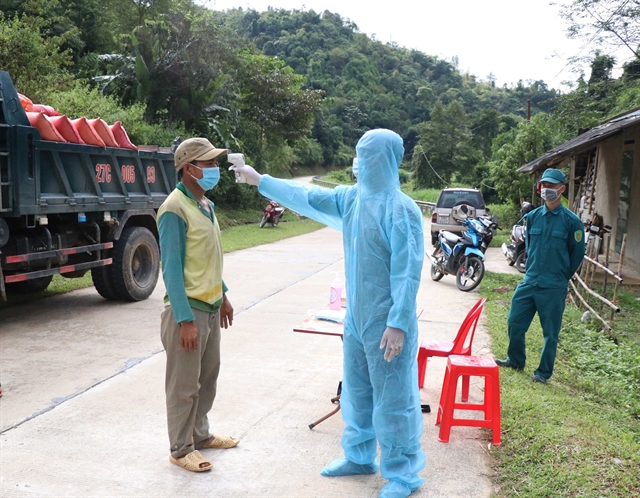 Society
Society


|
| A truck driver has his temperature checked at a checkpoint in Hát Tao village, Na Tông commune, Điện Biên District. Twenty-six new COVID-19 cases have been confirmed in the northern province of Điện Biên Phủ as of Wednesday. VNA/VNS Photo Xuân Tiến |
HÀ NỘI — Localities across the country need to remain proactive in dealing with new COVID-19 clusters, said members of the National Steering Committee for COVID-19 Prevention and Control in a meeting yesterday.
At the meeting, Deputy Minister of Health Trần Văn Thuấn said there has been an increase in the number of community cases in the past week.
“The pandemic situation is still unpredictable across the country,” he said. “Authorities of cities, districts, and towns need to be aware of their localities’ levels of pandemic and apply prevention measures accordingly."
Adapting to the pandemic with flexibility while keeping the fundamental prevention regulations of early detection, isolating new cases, and treating patients carefully were the centre discussions at the meeting.
The committee asked the Ministry of Health to focus more on distributing COVID-19 vaccines to localities at risk and high risk, especially the Mekong Delta and Central Highland regions, and prepare to send medical staff to help organise vaccination drives.
The ministry must also review localities’ needs for testing equipment as soon as possible and provide supplies so they can test people coming back from COVID-hit areas, according to the committee.
Regarding the situation in the south, Deputy Minister of Defence Vũ Hải Sản said although HCM City has basically got the pandemic under control, military units are on standby to help provinces in the Mekong Delta to vaccinate residents if required.
In terms of medical equipment, Deputy Prime Minister Lê Minh Khái told the health ministry that purchases must be done in accordance with regulations, made public, transparent, and catered to each locality. Should problems arise during the process, the ministry must report to higher authorities and propose solutions to get them solved as soon as possible.
Regarding children’s vaccination, the committee agreed that it’s important that students get their vaccines and resume in-person learning. But it doesn’t mean they can only go back to school when everyone has been vaccinated or the country is freed from COVID-19.
“Going back to school should be safe, and the children’s and community’s health should be protected. But it doesn’t mean there should be absolutely no student having COVID-19,” said Deputy Prime Minister Vũ Đức Đam, head of the committee.
“The education and health sectors must provide detailed instructions on pandemic prevention and control at schools and in the classroom, and prepare solutions for different scenarios when there are positive cases at school.”
He added: "Even though vaccination has covered a large proportion of the population, we still have to stick to the principles of anti-pandemic from the early days of preventing, detecting, isolating, zoning, stamping out, and treating early."
Hà Nội told to stay on high alert
On Tuesday Deputy PM Đam urged the capital city to stay on high alert as the COVID-19 pandemic has already “penetrated very deeply into the community”.
At a meeting with local officials, he said the city must remain flexible to adapt to the pandemic and stand ready to respond to the worse cases.
He asked Hà Nội to prepare procedures for home quarantine and treatment in case the coronavirus spreads on a larger scale.
Reporting on the local COVID-19 situation, director of the Hà Nội Department of Health Trần Thị Nhị Hà said the pandemic in the city is currently under control, but virus transmissions from localities with complex pandemic developments remains a risk.
Hà Nội has administered 9,664,917 doses of COVID-19 vaccine to local residents. About 92.3 per cent of adults have been given at least one shot, accounting for 69.4 per cent of its total population.
At the meeting, vice secretary of the Hà Nội Party Committee Nguyễn Văn Phong said the city will build a COVID-19 response plan at a higher level than the current one and devise appropriate measures to manage infection cases and those who come into close contact with them in accordance with the city's situation. VNS




